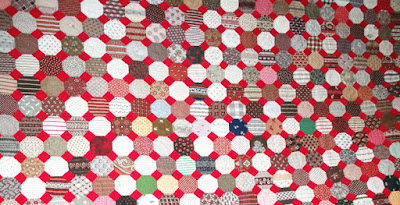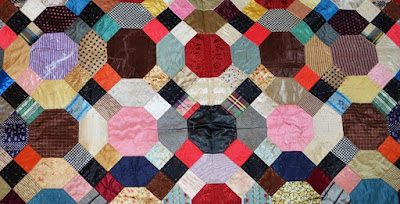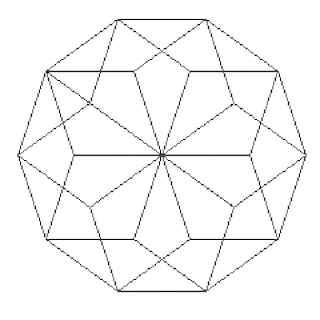Perhaps like me, you have learned the hard way
that an 8-sided shape won't tessellate.
Octagons need other pieces to cover the surface.
Above a traditional quilt pattern with octagons plus diamonds...
Octagons and squares.
Squares fill the gaps well.
Squares and long hexagons.
Once we get above six sides we are into shapes that do not tessellate.
No charm quilts below.
Regular polygons:
5 = Pentagon
6 = Hexagon
7 = Heptagon
8 = Octagon
9 = Nonagon
10 = Decagon
We have added to our vocabulary if not
our repertoire for tessellating charm quilts.
Pentagon and Heptagon
These complex shapes, however, do make interesting pattern when combined with other shapes. You rarely see them in antique quilts but there are lots of ideas on the web for pattern with Nonagons and Heptagons, etc.
A ring of heptagons
A decagon
A paper-pieced decagon.
Buy the pattern from Endulzar's Etsy Shop
Tessellations: Next-Curves
Long hexagons---6 sided shapes
(You may have noticed I have skipped the 6-sided shapes---hexagons---in discussing pattern that will tessellate or cover a surface with one piece. That's because it is such an ENORMOUS category. I am still working on sorting it all out. )












I love that quilt with the pink crosses! Plenty of inspiration, as usual, thanks!
ReplyDeleteReally enjoyed the post. Will add one thought. When you need to take your tessellation into three dimensions...head for the pentagon. Makes a nice small pincushion...larger soft play ball.
ReplyDeleteThis is a great post. Thanks for sharing!
ReplyDeleteIt's too bad they didn't teach quilting in high school; it would have made learning geometry much easier and more interesting. I love all the shapes.
ReplyDeleteI realize that your post is about tessellations, but I am really curious about the first quilt. Wondering where you saw the quilt. I have a quilt that looks exactly like this one that I picked up at an antique shop, but have no info on it. This quilt could be it's twin-same color placement of the shapes. I'd be interested in finding out more about the quilt. Thanks.
ReplyDeleteWow! This quilt consist of really tiny components! A lot of work, but it was worth that!
ReplyDeletePamela
ReplyDeleteThere are many quilts that look like this one. I probably found the photo in an online auction. It's a classic.
One more thing Pamela
ReplyDeleteI should have mentioned the estimated date. Those two contrasting blues, navy blue and cadet blue, are a great clue to about 1890-1920.